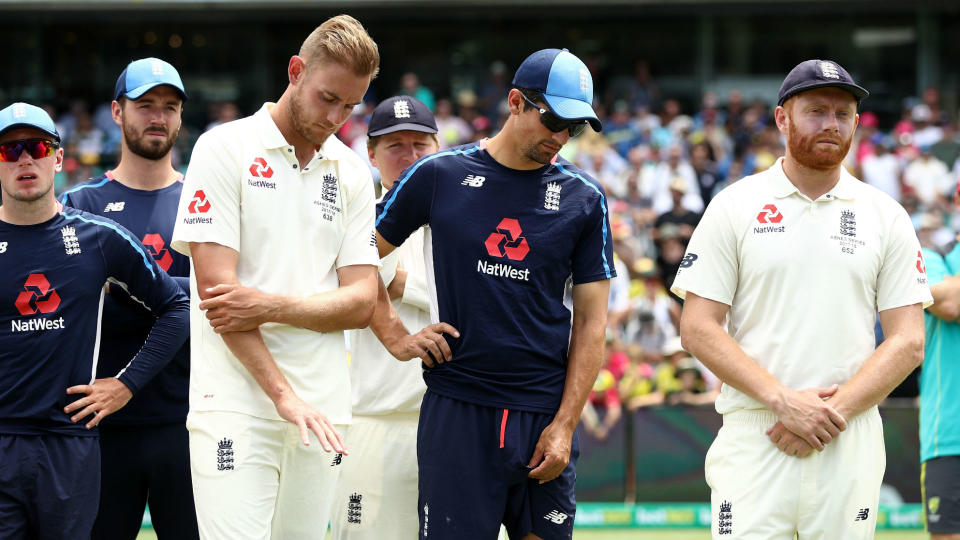Ashes: What next for England after another series humbling Down Under?

No sooner had England fallen to defeat for the fourth and final time, and a sickly Joe Root was trying to remember a happier time when he still had the urn and most of his dinners from the previous week, Trevor Bayliss confirmed something we all knew.
His contract runs to the end of next summer and that’s as far as he’s going with this side. Coming moments after a 4-0 Ashes defeat was confirmed, the words between the lines spoke of a coach who’d had enough.
It was nothing personal, he assured. Andrew Strauss, director of cricket, had known Bayliss would not be looking to renew his deal. “I’ve never been anywhere more than four or five years,” he said the day after Australia sealed the Ashes with another Glasgow kiss of a defeat.
Though not quite a whitewash, it was all but, and while Bayliss will get a crack at regaining them when Australia come over in 2019, he’ll be elsewhere when England return to make amends.
READ MORE: England will leave Australia with nothing but deja-vu
READ MORE: England not good enough – Farbrace
READ MORE: Vince aware of shortcomings, says Farbrace
Since Bayliss took over in May 2015, he has overseen 15 Test wins and 18 defeats. Those results, for the most part, have been intertwined enough to ensure notable series wins, such as an Ashes that summer and victory in South Africa at the start of 2016. There’s also, now, two four-nil defeats in there, after last year’s capitulation in India.
If there is a caveat – and there shouldn’t be considering the resources at the ECB’s disposal – it is that Bayliss was seen as a coach to improve the team’s fortunes in limited-overs cricket. On that front, he’s sticking to the task: 34 wins from 52 matches in ODIs, with the blemish of a semi-final defeat to Pakistan in the 2017 Champions Trophy.
England also made it to the final of the World T20 in 2016, coming within a few mishits of matching their winning efforts in 2010. As much as there is temptation to lay this Ashes despair at Bayliss’ door, he is doing good work in other areas.
Rarely have England been so watchable in coloured clothing, packed full of dynamic ball-strikers like Jos Buttler, Ben Stokes, Alex Hales, Jason Roy and others who have thrived on a licence to thrill. And with that has come an appreciation of white ball cricket as a whole that England gone without for the longest time. Unfortunately, Bayliss has not been able to impart that kind of clarity to the men in white.
There’s a repetitiveness to England’s play that Australia were able to rely on, especially during the moments when it looked like the tourists might just match them. Wickets just before stumps were as regular as clockwork, so too boundary balls just when pressure was being built in the field. Steve Smith’s side knew, whatever the situation, mistakes were around the corner.
So, what to do…
Well, nothing for now. ECB chairman Colin Graves and chief executive Tom Harrison have, separately, stated that Bayliss’ job is secure.
Those assurances were given prior to Bayliss’ statement on his future, but both would have known of his intentions and a word of support in these circumstances is merely a formality.
But how much time can pass with so little progress made? England, lest we forget, still don’t have a set opener, number three or noteworthy quick behind James Anderson and Stuart Broad – before something is done.
Pakistan and India tour this summer (two and five Tests, respectively), both with good memories against a team with the same problems they had when they last met in 2016. Defeat in both series will leave Bayliss’ position borderline untenable, but ousting him then, on the eve of a home World Cup would be disastrous.
It may be an option that the Australian continues his work with the white-ball while another coach is brought in to work with the Test side ahead of taking over full-time at the end of 2019.
Such a move may undermine Bayliss, who has promised to ensure the groundwork is in place for his successor ahead of the next overseas Ashes. But it might also work in his favour. He still lives in Australia and, when the schedule allows it, ensures he gets back home as much as possible. Taking him out of the Test cycle will enable him to perfect that work-life balance.

 Yahoo Sport
Yahoo Sport 






































